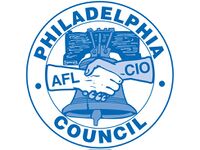Civil Society/Unions/Overview
– Eugene V. Debs

In Philadelphia, in 1794, shoemakers across the city banded together and formed the first labor union in the United States. You can more or less chart the grand arc of Philadelphia labor, and to a lesser degree national labor movements, from that point onward. Today, Philadelphia remains a proud union town. Its large port is home to the Longshoremen's Union, and from there the goods are loaded up into trucks by the Teamsters. The construction goods are then delivered to the Carpenters, the Pipefitters, the Plumbers, the Electricians-- all union --to build the schools for union teachers, and the factories for union assemblers. Union labor gets to and from work in buses and trains operated by union drivers. Union linesmen tend to the power grid and the telecommunications towers while union labor patches the roads. There are exceptions, of course, but in general terms if anything gets done in Philadelphia, it's done by a dues paying member of one of Philadelphia's hundreds of trade unions.
Behind every successful local politician is the support of a trade union. So much so that, over the years, numerous union heads have taken the fall for corruption, or for their ties to organized crime. Names like Jimmy Hoffa and Johnny Doc are synonymous with union corruption and graft, which just goes to show that bad things can spring up out of good ones. For the most part, the unions in Philadelphia ensure the working people of the city-- although admittedly predominantly the white and the male ones --enjoy good health benefits and stable, living wages. Two things Philadelphia's employers would absolutely love to do away with.